The satisfying crunch of ice on a hot day is tempting, but is that icy treat secretly damaging your pearly whites? The short answer is: yes, it can. While the occasional ice cube won't likely cause significant harm, regularly consuming ice can lead to several dental problems. Let's delve into the chilling details.
What Happens When You Chew Ice?
The hardness of ice makes it an abrasive substance. When you chew ice, you're essentially grinding a hard object against your tooth enamel, the protective outer layer. This constant abrasion can lead to:
- Fractured Teeth: The force of chewing ice can cause cracks or chips in your teeth, particularly if you have pre-existing weaknesses or fillings. These fractures can be painful and require costly dental repairs.
- Enamel Erosion: Repeated chewing of ice wears away the enamel, making your teeth more vulnerable to cavities and sensitivity. Thinned enamel also leaves your teeth looking dull and discolored.
- Increased Tooth Sensitivity: As enamel erodes, the underlying dentin layer becomes exposed. Dentin is much more sensitive to temperature changes, pressure, and even air, leading to uncomfortable sensitivity to hot and cold foods and drinks.
How Much Ice is Too Much?
There's no magic number of ice cubes that determine damage. The frequency and force with which you chew ice are the key factors. Occasional enjoyment is unlikely to cause significant issues, but regularly consuming ice – especially in large quantities – significantly increases the risk of dental problems.
What are the Symptoms of Ice-Related Tooth Damage?
Recognizing the signs of ice-related damage is crucial for timely intervention. Common symptoms include:
- Sharp Pain: Sudden, sharp pains when biting down or consuming hot or cold foods and drinks.
- Tooth Sensitivity: Increased sensitivity to temperature changes, sweets, or acidic foods.
- Visible Cracks or Chips: Noticeable cracks or chips in your teeth.
- Discoloration: Dullness or discoloration of teeth due to enamel erosion.
Can I Prevent Ice Damage to My Teeth?
Absolutely! Here are some preventative measures:
- Limit Ice Consumption: Moderation is key. Enjoy ice occasionally, not as a regular habit.
- Choose Alternative Coolers: Opt for other ways to cool down, such as chilled drinks or frozen fruit.
- Consider Your Teeth's Condition: If you already have sensitive teeth or existing dental issues, avoid chewing ice altogether.
What Should I Do If I Suspect Ice Damage?
If you experience any of the symptoms mentioned above, schedule an appointment with your dentist immediately. Early diagnosis and treatment can prevent further damage and minimize the need for extensive dental work.
Can Other Things Besides Ice Damage My Teeth?
Yes, several other habits and substances can damage your teeth, including:
- Bruxism (Teeth Grinding): Grinding your teeth can wear down enamel and cause fractures.
- Acidic Foods and Drinks: Frequent consumption of acidic foods and drinks can erode enamel.
- Poor Oral Hygiene: Neglecting proper brushing and flossing allows plaque to build up, leading to cavities and gum disease.
In conclusion, while the occasional ice cube won't likely cause significant harm, regularly chewing ice poses a serious threat to your teeth. By understanding the risks and practicing preventative measures, you can protect your smile and enjoy a lifetime of healthy teeth. Remember, your dentist is your best ally in maintaining optimal oral health.
